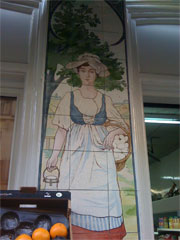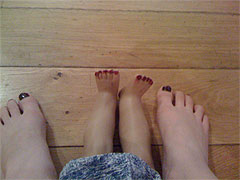A little bit of Polish
 …will abolish just what’s bothering you, as the song goes. Never mind that it’s a song about shoe polish. My guess is nail polish has the same uplifting capacity. Much like my aunt who proselytizes the restorative power of a good hair wash, I’m a believer that a pedicure is sometimes all you need to set things right. A good soaking of the feet, scraping away the dead skin, trimming of cuticles and cutting/filing the nails and then the deep red or sweet rose or mysterious vamp that reminds you every time you look down that you’re the kind of woman who makes the time to care for your feet.
…will abolish just what’s bothering you, as the song goes. Never mind that it’s a song about shoe polish. My guess is nail polish has the same uplifting capacity. Much like my aunt who proselytizes the restorative power of a good hair wash, I’m a believer that a pedicure is sometimes all you need to set things right. A good soaking of the feet, scraping away the dead skin, trimming of cuticles and cutting/filing the nails and then the deep red or sweet rose or mysterious vamp that reminds you every time you look down that you’re the kind of woman who makes the time to care for your feet.
Before I went home to take care of my ailing mother, a friend told me to take a picture of her hands and feet. “Because years later,” she said, “I couldn’t remember what my mother’s hands looked like.” It’s not so silly, except I can’t imagine forgetting this detail. My father’s well-manicured hands with his long and elegant fingers are something I can picture exactly now, as though I’d held them yesterday.
You all must be so tired of hearing about my dead mother. But I don’t know what else to write about. Everything seems banal compared to what I have been through these last weeks. I’m still losing my mind. The kids have made a train wreck out of my life. De-facto’s a prince, or then he’s not a prince. Short-pants is angelic and Buddy-roo is impish. It’s the same as it always was. Except it’s not the same.
I know this is a question of time. I still miss my father, but the constant ache and daily despair about his death no longer plagues me, though the occasional sting of wishing he was here when something important happens has not lost its venom, even after more than 20 years.
I try to do normal things. I stop to buy a baguette. “It’s been a long time since we’ve seen you,” says the baker’s wife. I tell her I’ve been away a lot. The way you say this in French is “J’avais beaucoup de deplacements.” Yes, I’m feeling very displaced, I think to myself in the pseudo-language of Franglais, a butchering of both French and English versions of a similar-but-not-quite-the-same words. Another good example: déranger, a disturbing verb in both languages, but more often used as an adjective in English. Sometimes in my head – or even out loud, to like-minded friends – I mumble, “I hope I’m not deranging you.” It’s a funny little language we expats use to effect a hint of sarcasm.
“And it was good, all your traveling?” she asks.

I want to tell this friendly, familiar local baker-woman that I’ve been gone because I went to help my mother die. It feels like I should tell her, she knows me well enough to notice I’ve been gone. It feels like she might care, but that doesn’t mean she will or that she should. Just because I am so tender doesn’t mean I should blurt it out and then have to continue the conversation, the answering of questions, the prolonged explanation to a kind stranger who has no context.
“Yes,” I say, “it was all good.” I don’t want to derange her with my grief.
Keep doing normal things. I make soup. Except it makes me think of those soups I used to make for my mother the last nights before she decided to stop eating. I do laundry. Except folding the sheets makes me think of her. Hanging the little socks on the drying rack in my living room makes me think of the only time she wrote something other than praise after reading one of blog posts, the one about our decision not to buy a new dryer when ours broke down. “You’re a busy working mother with two children,” she wrote, “so buy yourself a dryer.”
I miss seeing her name on emails in my box. I’ve actually left one of her last messages in my Gmail account, and occasionally I mark it as unread, so I can read it again, like it was new, like she just sent it. I know this is pathetic.
I get my haircut. I remember getting a trim the day before the last time I went to see her, how I cried through the entire appointment. I go to the aesthetician to get a bikini wax. This doesn’t remind me of my mother at all but it hurts so much and I’m so spent that I cry anyway. “Does it hurt that much?” she says, kneading the ball of caramel in her hand. “Yes. It hurts that much.”
Raquel, the Brazilian manicurist/pedicurist who comes to my home to attend to my nails arrives late as usual, so this feels a little normal. She massages my feet. This reminds me of seeing my mother’s face settling into a feline smile as I pressed my thumbs into the balls of her feet, massaging them for her before she went to sleep. Don’t go there, I tell myself. Don’t make everything a signifier for something sad, something lost, something about her.
While my feet are soaking in warm soapy water and my hands are drinking in the mystery treatment provided by her special magical coated plastic gloves, Raquel turns to Short-pants and Buddy-roo and says, “Who’s first?” They won’t let me near them with a nail-clipper or emery board in my hand, but they race to her. She is the Pedicure-Whisperer, the intuitive tender of nails, calming any child, even my two wild fillies, enough to cut and clean their fingers and toes. Buddy-roo chooses a dainty, unsurprising, princess pink; it’s Short-pants who startles me by pointing to a dark, vampy burgundy, close to my own preferred color. Raquel glances up at me, her eyes seeking permission. Why not? I shrug. She’s not the daughter I worry about taking this color to heart.

Later, as the varnish on my toes is drying, the girls arrive with their dolls, asking if they can paint their toenails, too. My first instinct is no. They’ll make a mess. They’ll ruin the dolls. “Sure,” I say, remembering that nail polish remover has already been invented. “But get our polish from the basket in our bathroom.”
There is jumping and cheering and running back and forth and setting up the dolls in small child-sized chairs. Raquel offers a few tips to the girls as their shaky hands struggle to paint the polish on the tiniest of doll nails. They do a surprisingly accurate job, and parade proudly around the living room displaying the polished extremities of their dolled-up dolls.
“Careful,” I warn them, “Keep them away from the couch.” (I can’t help myself.)
“We know, mama,” Short-pants says, “don’t worry.”
They march and laugh and celebrate (with aplomb) a splash of color on tiny toenails. They sing a song about nail polish, one they’ve made up on the spot. For the first time in a long time, things seem almost normal. This, I suppose, is how life goes on.